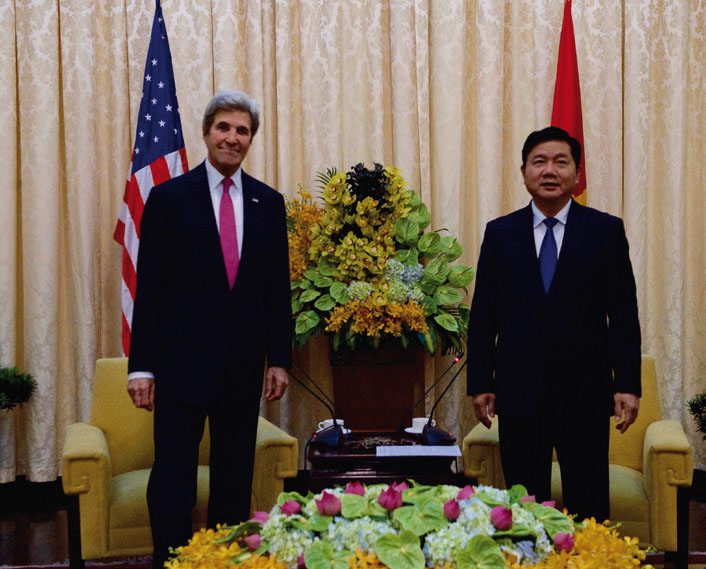Personnel issues at the CPV's seventh plenum
<p>The seventh plenum of the twelfth Central Committee of the Communist Party of Vietnam (CPV), which convened from 7 to 12 May 2018, discussed and made decisions on three key issues, namely the CPV’s strategic personnel planning and management, salary reforms and social insurance reforms. Of the three issues, personnel policy decisions and changes at the plenum has attracted the most attention given their important implications for the country’s political prospects.</p>
Guided by the late President Ho Chi Minh’s dictum that “cadres are the foundation of all works”, the CPV has consistently put a strong emphasis on its personnel management. In the context of economic reforms under Doi Moi, the Party regards personnel works as an essential element in its efforts to industrialize and modernize the country. Over the years, the Party has formulated and implemented various plans and policies to improve the quality of its cadres, especially those at key levels. However, such plans and policies have not translated into expected outcomes. The Party has acknowledged that weaknesses still remain in its personnel works, including the lack of effective mechanism for appraising cadres and recruiting talents, as well as the prevalence of corrupt personnel practices such as political patronage, nepotism or bribing for power and positions. The CPV’s on-going anti-corruption campaign, which saw the prosecution of various high-ranking officials at both the central and local governments has further reinforced the importance of personnel works for the Party’s legitimacy.
Against this backdrop, a draft blueprint on the Party’s personnel strategy up to 2030 and beyond was presented to the Central Committee’s seventh plenum for its deliberation. The blueprint is divided into five sections. The first outlines the theoretical and practical basis of the blueprint. The second reviews the current status of the Party’s personnel works. The third proposes guidelines, objectives and solutions to improve the Party’s personnel works. The last two sections assess the blueprint’s impact once implemented and propose measures for its implementation. Some of the key measures include reforming the procedure and methods for appraising cadres; strictly controlling cadres’ power, putting an end to the practice of bribing for power and positions; introducing the rule that the party secretary of a given province or district must not be a native of the same province/district; reforming salary policies to incentivise cadres’ performance and attract talent into public institutions; and, improving mechanisms to strengthen ties between cadres and the people. Once implemented, the blueprint envisions that the quality of Vietnam’s bureaucracy will be strengthened and the efficiency of the entire political system will be improved. It also expects to alleviate the government’s budgetary deficit by reducing the number of officials, cadres and state employees.
The blueprint served as the basis for the CPV Central Committee to adopt a resolution on the Party’s personnel works at the end of the plenum. While it remains to be seen whether the CPV can successfully implement the measures proposed by the blueprint, the move demonstrated the Party’s will to strengthen the quality and integrity of its cadres as well as the resilience of its political system. The adoption of the resolution should also be seen in the light of the CPV’s recent efforts to crack down on corruption and to further institutional and economic reforms, both of which will hardly be successful without a cleaner and more capable cadre system, especially at the leadership level.
The seventh plenum was also widely expected to elect additional members into the Politburo, the highest decision-making body of the Party. The additional members were expected to replace Mr Dinh La Thang, who was removed from the Politburo in May 2017 on corruption and economic mismanagement charges, and Mr Dinh The Huynh, who is seriously ill. Instead, the plenum saw the election of additional members into the Party Secretariat: Mr Tran Cam Tu, Standing Deputy Head of the Central Committee’s Inspectorate Commission, and Mr Tran Thanh Man, Chairman of the Vietnam Fatherland Front (VFF). Mr Tu was also elected Head of the Inspectorate Commission after Mr Tran Quoc Vuong vacated the position to focus on his other post as Standing Member (i.e., Executive Secretary) of the Secretariat.
Since December 1993, the Party’s Inspectorate Commission has always been headed by a Politburo member. As such, the Party’s assignment of the position to Mr Tu rather than an existing Politburo member suggests that Mr Tu will likely be elected into the Politburo in future. His current appointment will give him the necessary authority to oversee the Party’s anti-corruption campaign. Similarly, Mr Man also stands a good chance of being elected into the Politburo as the VFF in recent decades has normally been headed by a Politburo member. Mr Man’s rather young age (56) and Southern origin may also play to his advantage as the Politburo is currently dominated by Northerners while the Party normally seeks a relative balance in the regional representation of its top decision-making body.
Le Hong Hiep, Fellow at ISEAS-Yusof Ishak Institute
This is an extract from Le Hong Hiep’s ‘Personnel Issues at the CPV’s Seventh Plenum’, ISEAS Perspective 2018/29; https://www.iseas.edu.sg/articles-commentaries/iseas-perspective
